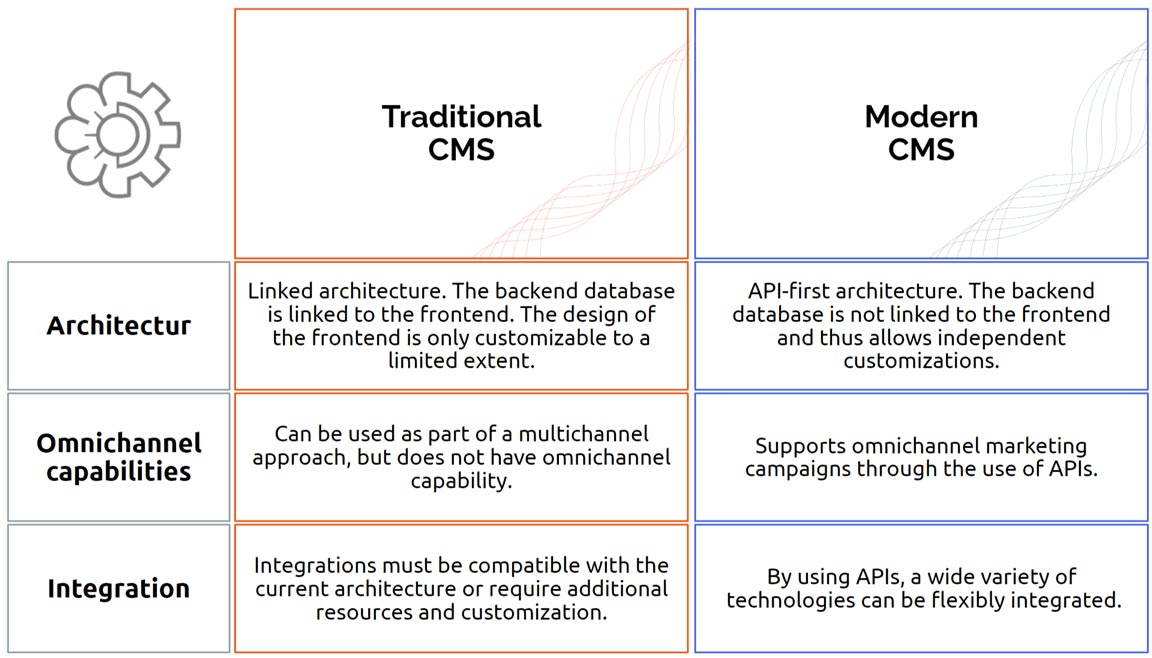THE MODERN CMS The key to success in omnichannel marketing
Marketing products or services online used to be a lot easier than it is today. While almost everyone used to access the internet via a desktop or laptop, today's average customer uses multiple devices (mobile, notebook, tablet) to engage with brands. From good old emails to smartwatch notifications. Consumers want digital experiences to be channel independent. In this article, we'll look at how a modern CMS enables you to deliver successful omnichannel experiences for your customers.

- What is Omnichannel Marketing?
- What is a modern CMS?
- How a modern CMS enables omnichannel marketing
- Why omnichannel marketing with a traditional CMS is challenging
- How a modern CMS can enable omnichannel experiences
- How a modern CMS can support omnichannel marketing campaigns and future-proof your business
- How does Storyblok support omnichannel marketing?
- Stronger's rebranding with an omnichannel solution from Storyblok
- Is omnichannel marketing the right path for you?
What is Omnichannel Marketing?
According to Gartner, omnichannel is "the synchronization of channels (mobile, desktop, smart devices and in-store) to support the customer journey from initial brand discovery to conversion. This together with the customer experience during and after the purchase.
The point of omnichannel marketing is that every time a customer engages or interacts with your brand through a touchpoint, it feels like their previous action just continued.
An omnichannel customer journey might look like this:
A customer sees a Facebook ad that catches his attention.
He clicks on the ad and is taken to a landing page with product details.
The customer clicks to buy the product. However, for some reason, he exits the shopping cart again before completing the purchase.
A few hours or days later, the customer receives an email with an incentive to complete the purchase.
The customer buys the product,
Weeks later, the customer receives social media ads for similar products or better versions of them to encourage up-selling or cross-selling.
What is a modern CMS?
A modern CMS provides a backend content repository where all the content of a brand is stored and managed. Through the use of APIs, this content can then be published to different channels or devices.
Most companies are familiar with older or traditional content management systems, such as WordPress. These are tightly coupled with the front end. This makes sense if you have a traditional corporate website or blog. However, if you want to provide an omnichannel experience on multiple channels for your customers, then a traditional CMS is not suitable for that.
Unlike a traditional CMS, a modern CMS is front-end agnostic and it uses APIs to deliver content.
"Frontend-agnostic" is about the fact that, unlike WordPress, content is not tightly coupled to a template or a website. Instead, the content is freely available in the CMS and can be published through any channel.
How does this work, exactly? This is where APIs come into play. Using APIs, a modern CMS can push content to any front-end experience. Thus, developers can design smartwatch apps, VR apps, various web apps, and more without worrying about where the content is coming from.
This is also referred to as a headless CMS approach.
However, a modern CMS doesn't just offer freedom on the front end. Thanks to APIs, modern content management systems can be integrated much more easily with third-party systems, such as a CRM, e-commerce or marketing automation platform. This makes it much easier to implement omnichannel experiences.

How a modern CMS enables omnichannel marketing
A modern CMS efficiently supports omnichannel initiatives. Marketers can deliver content to customers at any time, while collecting all data from every touchpoint. This not only gives marketing teams a 360-degree view of their customers, but also gives them unlimited opportunities to engage with them across all relevant channels. Modern CMSs also support early adopters who are ready to adopt new content delivery technologies and channels such as IoT, VR, and AR.
The following image shows the differences between a traditional CMS and a modern CMS.

Why omnichannel marketing with a traditional CMS is challenging
A traditional CMS was originally designed to manage content on a desktop website. Over time, these platforms have also managed content for mobile devices via mobile-optimized websites. However, creating omnichannel experiences is virtually impossible with these platforms. Here's why:
Lack of connectivity: traditional CMS platforms struggle to connect with new and emerging channels like IoT devices. Content gets stuck in silos, and there are no easy workflows to connect everything together.
No personalization: another aspect of the omnichannel experience is content personalization. This at every stage of the customer journey and across multiple channels. Traditional CMS platforms cannot personalize content to the extent required.
How a modern CMS can enable omnichannel experiences
According to Gartner, by 2020, only 32% of marketers have combined their website with the appropriate marketing efforts. This means that most still have a long way to go to develop a true omnichannel marketing strategy.
A modern CMS can help marketers with their omnichannel initiatives by providing more than just a database to store and manage content. A modern CMS platform plays an important role in the brand experience. It provides a central base from which to plan and maximize content profitability. Content is published in a timely and flexible manner, thereby driving conversion.
Storyblok's CMS helps companies address the expectations of today's customers, learn from every interaction, gain insights from their behavior, and automate manual processes. As a modern CMS that offers more than just a headless architecture, Storyblok supports your omnichannel marketing efforts with content that is relevant to both your customers and the channel in question, giving your brand an important advantage.
How a modern CMS can support omnichannel marketing campaigns and future-proof your business
Connect messaging services with your CMS
With a modern CMS, you can effortlessly build relationships with customers. The API-first approach allows you to integrate messaging services, such as Whatsapp. This allows you to reach customers in a personalized way that is less intrusive than an email marketing campaign or push SMS notifications.
Create multilingual customer journeys
Language is the key to the world. Creating a multilingual Customer Journey has never been easier with a modern CMS. Localize your customers and adapt the language automatically. Reach new potential customers and open up new markets without having to spend a lot of money on translations.
Deliver fast and stunning visual experiences
Omnichannel marketers often use headless-only CMSs to deliver omnichannel marketing. However, the truth is that pure headless platforms fall short when it comes to providing the proper tools they need to create stunning visual experiences for your customers. Storyblok's visual editor enables marketers to create omnichannel experiences without code.
Leverage the API-First Model
Modern CMS platforms like Storyblok have embraced the API-first model because it allows for seamless integration of third-party data and technologies. APIs give developers the ability to integrate all customer data and technologies in one place. This allows for the creation of targeted content.
Improved personalization
With a modern CMS, it is possible to best cater to each individual customer, their needs, intentions, as well as the channel through which they arrived at the website. Storyblok's personalization feature creates custom-fit recommendations for your customers based on individual actions or preferences, showing only the products that appeal most to your customers.
How does Storyblok support omnichannel marketing?
With Storyblok's flexible and open CMS, content is stored centrally and can be published at any time across any channel. Marketing messages are optimized, communication channels are consolidated, and only compelling content is published across every touchpoint. A modern CMS like Storyblok offers the following benefits:
Increased sales
With a modern CMS and appropriate omnichannel marketing measures, they reach a wider audience. They ensure that they inform every potential customer about planned promotional activities and upselling opportunities, which increases the chances of further purchases. In addition, customers are more likely to spend more on a product than if they only become aware of it through one channel.
Higher customer loyalty
With omnichannel initiatives, your customers are always in the loop and connected to your brand. You ensure that your brand remains top of mind even when the customer is actually planning to buy another product.
Improved personalization
A modern CMS enables personalization on many different levels and throughout the entire customer lifecycle. With Storyblok, you can map the lifecycle of your customers and determine what type of content they receive and at what stage of their life. Based on their needs and wants.
Internationalization and localization
Another important benefit of a modern CMS and omnichannel marketing is that content can be delivered to audiences in different countries. Customers are automatically localized and addressed in their language. This, of course, increases the chances of a purchase. With Storyblok, creating multilingual customer journeys is effortless and straightforward.
Stronger's rebranding with an omnichannel solution from Storyblok
Swedish lifestyle brand Stronger needed a headless CMS that would allow them to quickly deliver content and rebrand for their international market. The previous monolithic system didn't offer the flexibility the marketers and developers needed. They also had to set up international websites that functioned separately, requiring a lot of manual effort. With Storyblok, they could easily launch new campaigns and effortlessly create omnichannel and localized content. Ultimately, they saw a 172% increase in sales and a better user experience.
Learn more about how the Stronger brand used Storyblok to optimize growth and rebranding.
Is omnichannel marketing the right path for you?
The short answer is yes.
Omnichannel marketing can help any business connect with its customers through both brick-and-mortar and digital channels. With an omnichannel marketing strategy supported by a modern CMS like Storyblok, you give your customers all the information they need to complete a purchase and then come back for more.
Omnichannel should not be taken lightly, however. On the contrary, you need the right strategy and tools to ensure that your planning and executions are successful. To deliver optimal and seamless experiences, you also need to have well-functioning processes in place, and the best way to do that is to leverage the power of a modern CMS.
Omnichannel marketing has many potential benefits. It boosts your sales and increases your customers' affinity for your products. An omnichannel approach optimizes the digital experiences for their customers that are relevant to the purchase and channel. With an omnichannel marketing strategy supported by Storyblok, you can optimize your e-commerce store and benefit from knowledge about future market trends.
To learn more, visit Storyblok's omnichannel CMS website. Learn how Storyblok helps you create better omnichannel experiences.
